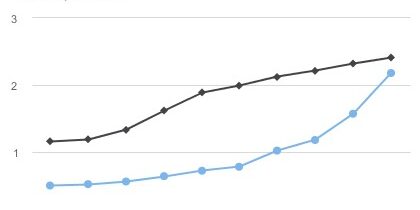With all the talk in the news of interest rate increases by the big banks, you may wonder why mortgage rates are rising if the Bank of Canada hasn’t increased rates. It hardly seems fair, so why are mortgage rates rising?
It’s hard to miss the fact that mortgage rates are increasing with so much coverage in the media. These are some of the articles from just the past 2 days:
- Jumping Mortgage Rates Further Tighten Debt Vise for Canadians (Bloomberg)
- Why did mortgage rates just surge? (Maclean’s)
- Toronto-Dominion Bank lifts mortgage rate in ‘biggest move in years,’ RBC follows suit (Financial Post)
- TD, Royal Bank both raise their fixed mortgage rates (CBC)
- CIBC to raise five-year fixed-rate mortgage rate today (Globe and Mail)
- CIBC follows TD, RBC to raise its five-year fixed mortgage rate today (Financial Post)
- CIBC raising fixed 5-year mortgage rate by 15 basis points on Tuesday (BNN)
Just 2 weeks ago at the last meeting we heard “Bank of Canada holds rates steady, remains ‘cautious’ on future hikes“, so if the BoC isn’t raising rates why are the banks?
How Mortgages are Priced
A lot of this can be clarified by understanding how mortgages are priced. There are 2 main types of mortgages, fixed and variable rate mortgages, and each are priced differently.
Variable Mortgage Pricing
Variable mortgage rates are priced based on the prime rate and fluctuate as the prime rate moves up or down. The prime rate does tend to move when the Bank of Canada changes it’s overnight rate which is why we’ve seen 3 increases already in the past year matching the 3 Bank of Canada rate increases.
Fixed Mortgage Pricing
Fixed mortgage rates are priced based on bond yields of comparable terms which aren’t directly related to the Bank of Canada rate. The best indicator for 5 year fixed mortgage rates is to track the 5 year government bond yields. Over the same 1 year period here is what we see:

Consistently higher yields on the 5 year government bond have led the banks to increase their 5 year fixed rates.
Bond Yield Curve
Bonds price in market expectations of where rates will be in the future. Without getting into complex economics, just know there are very smart people with very powerful computers and lots of money at stake in getting these predictions to be as accurate as possible. The bond yield curve can give you a hint of where rates are likely to be in the future as well (eg. at your renewal time). Here’s how the bond yield curve looks as of today:

The black line represents today’s yields for various terms, and the blue line represents the same yield curve from 1 year ago. What we see is:
- Rates have risen
- The expectation is for higher rates across all maturities
- We are expecting rates to rise faster now than we were a year ago (look how we get to ~2% on a 2 year term vs. the expectation a year ago that it would take more than a 10yr maturity to get that same yield)
Fixed vs. Variable 5 Year Comparison
Over the long run borrowers tend to win with variable rates so long as they can handle the risk. Here’s a comparison of how fixed and variable rates have looked over the past 5 year period:
The gap between the 2 lines is essentially your interest savings as the borrower.
So, what should you do about it?
It depends on many factors such as:
- What is your income today vs what do you expect it to be in the future
- What does your budget look like on a monthly basis? Are you cash strapped or do you have some breathing room?
- Is there a chance you will move within the next 5 years? (Beware the penalties on long fixed mortgages)
- Are you aggressively paying down your mortgage to eliminate bad debt?
- Are you paying down your mortgage and then borrowing to invest so you can convert bad debt to good debt?
- What is your personality type? Are you very conservative or are you okay with some uncertainty?
If you’re variable now or have a renewal approaching within the next year, you may want to consider locking in before rates rise further, but it all depends on your financial situation and discount to prime.
Contact me today and I’d be happy to have a look at your current situation and offer great unbiased mortgage advice on topics like whether fixed or variable will help most with your financial goals.




